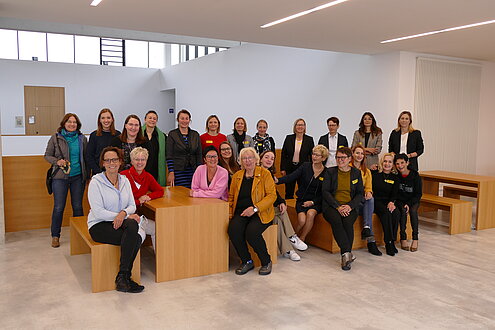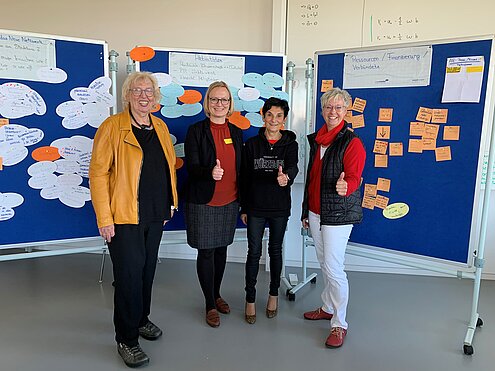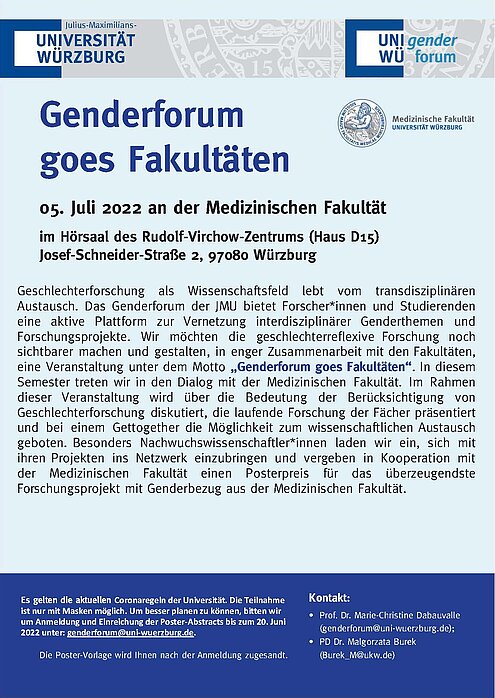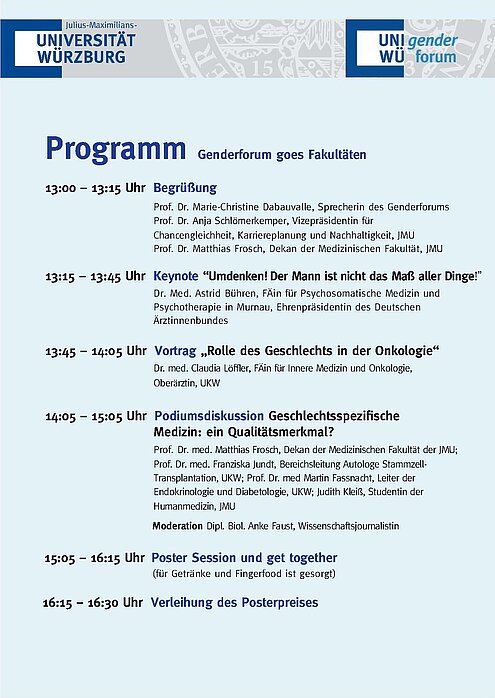events
This topic concerns both the biological and social dimensions of gender. For three days, we will approach this topic on various levels, e.g. through questions such as: Where does gender-sensitive medicine stand? What does AI have to do with gender and health? How can gender influence mental health? Are there gender-specific differences within the so-called Generation Anxiety? And much more.
Participation is free of charge and all students and young researchers are welcome. A detailed programme and flyer will be available here shortly.
Registration by 15 September by e-mail to genderforum@uni-wuerzburg.de.
After the welcome address by Vice President Prof Dr Anja Schlömerkemper, there will be a poster session for students and early career researchers. At this opportunity, participants can present their research on current projects related to gender and/or diversity research to a broad audience and network within the university. The best poster will be honoured with a prize. After the poster session, Prof. Dr Heike Rittner (Chair of Pain Medicine) will give a keynote lecture entitled "Gender differences in pain perception - what is it?" at 4:15 pm.
Registration by 15 September by e-mail to genderforum@uni-wuerzburg.de.
Climate change fundamentally affects everyone. But what is the connection between gender and climate change? We want to spend three days discussing this topic.
You can find more information about the programme and how to register here.
"A Person's Gender Lies So Much Less in Their Body, Than in Their Soul ..." (Magnus Hirschfeld): Trans* Identities in Historical Perspective
Fri, 07.07.2023, 6 pm
Toscana Hall of the Würzburg Residence, South Wing, Residenzplatz 2, Gate A
Lecturer: Dr Rainer Herrn, Institute for the History of Medicine and Ethics of Medicine, Charité Berlin
The lecture will be followed by a reception in the Martin von Wagner Museum in the Residence.



The new women's network is the first of its kind to bring together representatives from science and business. It aims to establish a continuous dialogue between these groups with a regular symposium. The aim of "Only Together" is to create a network that provides best practices, implements the latest findings in gender research and promotes the careers of women in business and science.
Every Wednesday 10-12 am, from 27 April 2022 in S1.101
Faculty of Mathematics
Responsible: Dr Nicola Oswald
For three days, we will be looking at the role of gender in the various media formats. What is the connection between gender and language? How does gender affect the area of "human-computer media"? What role does gender play in social media and what does this have to do with hate speech? Art and gender - who has ever thought about this? We will answer these and more questions with experts from a wide range of fields!
Find out more about the programme and how to register > here.
Online event, please register for the individual lectures by email to genderforum@uni-wuerzburg.de
Thursday 28.10.2021 12:00 pm - 1:00 pm
Gender stereotypes in the media - water under the bridge? Psychological consequences of gender-stereotypical representations in comedy, Instagram & Co
Dr Silvana Weber, Institute Human-Computer-Media, Chair of Psychology of Communication and New Media,Julius-Maximilians-Universität Würzburg
Despite social changes, gender-stereotypical representations persist in TV, advertising and new media. In comedy programmes, for example, stereotypes about women and men are communicated in a humorous way, while on social media users often portray themselves in stereotypical ways. What effects can stereotypical, but also counter-stereotypical media portrayals have on our thinking and behaviour in everyday life? What role does identification with a positively or negatively stereotyped group play? Based on social and media psychological theories and findings, the lecture provides an overview of the possible consequences of gender-stereotypical media representations.
Thursday 18.11.2021 12:00 pm - 1:00 pm
"I photograph the world the way I like it." On the power of the United Nations to construct gender roles
Dr Manuela Scheuermann, Institute of Political Science and Sociology,Julius-Maximilians-Universität Würzburg
Photographs are not only a reflection of our reality, they also have the power to decisively shape our perception of the present. This applies to all areas of social and political life and stereotypes, including gender roles, for example. Reality can be socially constructed with the help of the medium of photography. This is common practice in advertising, but also in politics. The United Nations (UN) uses photography to disseminate realities through the media. However, they can also use images to rewrite realities in exactly the desired sense. This will be shown using the example of UN peacekeeping operations. The United Nations website suggests that almost all UN peacekeepers are female. In reality, however, female soldiers make up only 4 per cent of the 80,000 soldiers in UN peacekeeping operations. While female soldiers in the field are often entrusted with activities associated as typically female, on the UN website they fly fighter jets, sit armed on tanks and look into the camera with heroic poses. The power of these images and socially constructed gender are the subject of this lecture.
Thursday, 9. 12. 2021 12:00 pm - 1:00 pm
"How gender-sensitive are educational media? A question of scale"
Dr Christine Ott, Chair of the Didactics of the German Language and Literature,Julius-Maximilians-Universität Würzburg
Research and public discourse differ as to which approach to 'gender' and gender-related representations in texts and images is considered gender-sensitive. Using the example of contemporary German educational media, we will show which positions clash in the gender discourse and which representations of gender are considered acceptable or desirable in each case. The focus is on the 'discourse arena of textbooks' and the 'discourse arena of licence-free learning aids' with the understandings of equality negotiated there.
Thursday, 13 January 2022 12:00 pm - 1:00 pm
"She wants to be married and give the children names!"Women and the Roman army in 21st century cinema
Prof Dr Jorit Wintjes, Department of Ancient History, Julius-Maximilians-Universität Würzburg
Since the great success of Ridley Scott's "Gladiator", cinematic representations of antiquity are enjoying renewed popularity. This lecture takes a closer look at how the role of women in Roman society in general and their relationship to the Roman army in particular is portrayed in film.
A cooperation between the Gender Forum of the University of Würzburg and Hawkamah (The Institute of Corporate Governance, Dubai) with the support of BayIntAn (Bayerische Foprschungsallianz)
The UAE's Vision 2021 calls for the UAE to become one of the top 25 countries globally enabling more women participation in society and economy. Substantial research highlights the importance of gender diversity leading to more innovative thinking, productivity, profitability, sustainability and a greater impact on actual and perceived returns. Closing the gender gap, it is mentioned, would add $28 trillion to the value of the global economy by 2025.
In tackling gender equality for listed companies, Germany introduced a gender quota for supervisory boards in 2016. Listed companies have to achieve a 30% quota of women in board positions. In addition, gender research is currently a very important aspect for all research proposals from the academic community.
Still women remain significantly underrepresented in the halls of corporate decision-making, with fewer women than men sitting in decision-making positions. Forward-thinking companies and organisations should be looking for ways to empower more women at work. Companies and organisations need a comprehensive plan for supporting and advancing women.
The purpose of this Genderbridges Dialogue is to bring together practitioners and academics to explore possible barriers and solutions to promote gender equality. Our purpose is to bring out common themes across Germany and the UAE that have proven to lead to change in gender diversity and equality.
Contact: Prof. Dr Marie-Christine Dabauvalle
genderforum@uni-wuerzburg.de
Tel: +49 931 3188055
The Winter School of the Gender Forum of the University of Würzburg with the focus on "Gender and Protest" took place in cooperation with the Faculty of Biology from 22-24 February 2021. The three-day Winter School, funded by the Federal Ministry of Education and Research (BMBF), enabled a lively exchange between students and doctoral candidates with scientists from the University of Würzburg, international experts and artists on the current discourse on gender and various forms of protest. The disciplines of sociology, English literature, Slavic studies, European ethnology and impulses from the fields of public art and rap were represented. In a variety of workshop and lecture formats, the experts presented examples of their respective research foci, questions and methods and addressed thematic aspects that were discussed intensively in small groups as well as in large groups.
Unfortunately, the dynamic situation of the Covid19 pandemic did not allow participants to meet in person at this time, which is why the Winter School took place exclusively virtually. However, this obstacle also had the great advantage that over 90 participants from different universities across Germany were able to take part in the Winter School. Participants received the Gender Forum certificate for their regular participation in the Winter School.
Programme overview:
Monday, 22.02.2021: Adult Education and English Literary Studies
- Self-Identification, social expectations and transgender: Protest and protection in India, Dr Bani Bora (Delhi)
- Poetry in a Time of Protest, Dr Jennifer Leetsch (Würzburg)
Tuesday, 23.02.2021: Sociology, Public Art and Slavic Studies
- Gendergaga? On the symptomatic politicisation of a category, Prof. Dr. Paula-Irene Villa Braslavsky (Munich)
- As long as...am I a feminist?!? Feminism and Activism in Public Space / Workshop Part I, Katharina Cibulka (Innsbruck)
- Transnational Texts and Contexts for 'No Wave' Feminism(s): A Workshop, Jessica Zychowicz (Toronto)
Wednesday, 24.02.2021: European Ethnology, Public Art and Rap
- Gender History as a Tool for Protest and Resistance? Cultural anthropological perspectives on German women's protest movements, Isabella Kölz (Würzburg)
- As long as...am I a feminist?!? Feminism and activism in public space / Workshop Part II, Katharina Cibulka (Innsbruck)
- A conversation about gender and protest in rap, Sookee (Berlin)
- Gender aspects of mental illness, Prof. Dr med Sarah Kittel-Schneider, University Hospital Würzburg, Clinic and Polyclinic for Psychiatry, Psychosomatics and Psychotherapy, (09.12.2020)
Not only do illnesses occur differently in men and women, but the manifestations, progression and psychological and somatic comorbidities can also differ considerably. This can and should also be taken into account in drug and non-drug therapy. The lecture will provide an overview of the current data on this topic and discuss how gender aspects of mental illness can be better taken into account in the future in order to optimise the diagnosis and treatment of those affected.
- Women, peace and security under the conditions of the corona pandemic, Dr Manuala Scheuermann: Institute of Political Science and Sociology, University of Würzburg, (11.01. 2021)
How does the pandemic affect the lives of women, especially in conflict countries, and what does this mean for the great global project of gender equality?
- Gender and age specificity of COVID 19, PD Dr Christine Krempl, Institute of Virology and Immunobiology, University of Würzburg, (18.02.2021)
The current state of knowledge on infections caused by the SARS coronavirus-2 (SARS-CoV-2) and involved disease pathogenesis (COVID-19) will be explained. Special focus will be placed on the gender- and age-specific differences in patients' reactions to infection with SARS-CoV-2.
We were once again able to organise the second Gender Forum Summer School with the support of the BMBF and in cooperation with the Faculty of Biology from 7 to 11 October 2019. Scientists from JMU, Goethe University Frankfurt am Main, Ludwig-Maximilians-Universität München and Otto Friedrich University Bamberg from the fields of physiological chemistry, law, education, sports science, German studies and linguistics/gender studies gave lectures on the current interdisciplinary question of the multiplicity of genders.
The participants received the Gender Forum certificate for their participation.
Programme overview:
Monday, 07.10.2019: Pedagogy
- Gender images in children's books, Dr Lars Burghardt (Bamberg)
Tuesday, 08.10.2019: Physiological chemistry and sports science
- Sex development and sex change in fish: Heredity and environmental influences, Prof Dr Manfred Schartl
- Exercise, sport and training -- all a question of gender?, Dr Birgit Sperlich and Prof. Dr Billy Sperlich
Wednesday, 09.10.2019: Literature and Cultural Studies, Law
- Hermaphrodites, hermaphrodites, androgyny in literature and the visual arts, Dr Petra Zaus and Dr Isabel Fraas
- Gender as a legal category, Dr Berit Völzmann (Frankfurt a. M.)
Thursday, 10 October 2019: Linguistics/ Gender Studies
- Exit Gender, PD Dr Lann Hornscheidt
Friday, 11 October 2019: Didactics of German language and literature
- Gender marketing, Dr Christine Ott (Munich)








